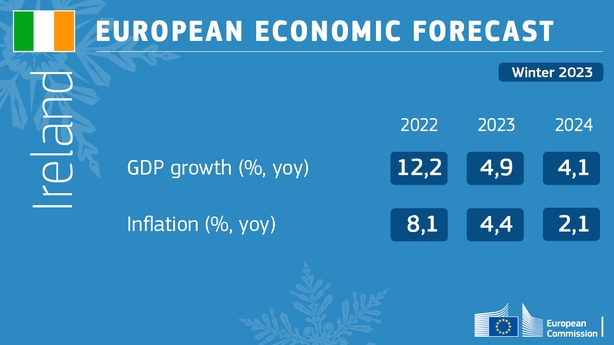
The European Commission has revised upward its forecasts for economic growth in Ireland this year.
In its winter 2023 economic forecast released today, the commission forecasts the economy here will grow by 4.9% in GDP, compared with the autumn forecast of 3.2%.
The growth rate for next year was raised to 4.1% compared to the previous forecast of 3.1%.
The European Commission forecasts that inflation will slow to 4.4 percent this year, down from last year's average of 8.1 percent. They believe inflation will drop to 2.1 percent next year.
There was a 92% increase in investment in the third quarter of last year compared to the previous quarter. The commission says growth was "much stronger than expected", mainly by multinational companies. This shows into a 12.2% increase in GDP by 2022.
Higher household savings coupled with a strong labor market will underpin further growth in consumer spending, the commission said.
Inflation is expected to remain high at the start of the year but will ease towards the end of the year.
However, uncertainty remains around the Northern Ireland Protocol and they offer hope that "the performance of multinational corporations will drive growth in both directions".
Taking the EU and euro area as a whole, the Commission now believes the region's economy will more likely escape the recession predicted in November.
It revised its GDP growth forecast to 0.8% in the EU and 0.9% in the euro area this year.
The forecast for inflation in the EU this year has been cut to 6.4% and in the euro area to 5.6%, with inflation next year at 2.8% in the EU and 2.5% in the euro area.
It said lower gas prices had benefited the European economy before Russia invaded Ukraine.
It notes that there has been a "sharp decline" in consumption and diversification of gas producing markets. It also says the "resilience" of corporations and households has been "amazing".
At the same time, the commission also said that the expected slowdown in the economy in the third quarter of last year was not as bad as expected. The economy stagnated but did not shrink.
However, the EU economy is still "beset by challenges", with headline inflation rising last month and households and businesses still facing high energy costs.
The report says there has been no "significant negative impact" on Ireland's labor market despite recent job losses announced at some "major tech" companies. Jobs in the multinational sector are said to have grown by 9% last year.
📚READ ALSO:


.png)
The opinions posted here do not belong to 🔰www.indiansdaily.com. The author is solely responsible for the opinions.
As per the IT policy of the Central Government, insults against an individual, community, religion or country, defamatory and inflammatory remarks, obscene and vulgar language are punishable offenses. Legal action will be taken for such expressions of opinion.